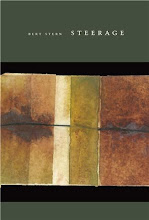Steerage, by Bert Stern,published by Ibbetson Press 2009 http://ibbetsonpress.com
Review by Anne Brudevold
Bert Stern’s, Steerage, like a good wine or violin, is best savored, sipped, tried out and conversed with as you experience it, for a long time. Few authors invoke that involvement—the conversational mode. Stern is one. You are on the page with each speaker, dispassionately looking life right in the eye from different points of view. Stern takes on the world, and the world answers back, in infinitely engaging moods and plain, evocative language, often near-rhymed. “As I cross the yard,/ rope scrap hanging /from maple limb/hootchy-kootches/ in the wind,” (Country Cow)
Stern is not intrusive. He’s the fly on the wall.
Didn’t want to be born, this child,
herself back, upside down, Aunty
could not get her turned, afraid, mother
screaming, did God know what He was doing,
was this to be chosen, crying out
under leaden skies among enemies,
without meat, making soup from barley
and bad potatoes, maybe a shank bone?
For this the muzhiks had spared her,
God in his eye. (Lotty is born)
His transparency strengthens the images he evokes. His graphic description of experiences of his ancestors during and since their emigration, and their experiences in the New World is so involving that I found myself muttering as I read, and my friends saying, “What? Oh, you’re talking with Bert.”
His language is plain. Especially in Part 1: Changing Places the many inversions give a Jewish or foreign cast to some of the poems. “A gold star we embroidered/ on black to lay over the coffin/bright star, to shine under the dirt.(Hannah remembers) The language becomes more American in the second part, but echoes of inversions and accents remain. Part 2: Spring and Fall “Always a white-throated sparrow/singing on a mountain top, and somebody/there listening to it for the first time.” (White Throated Sparrow)The progression of language characterizes the speaker, first invoking the steerage of the boat, then settling in the new country.
Stern, as well as being a large-scale poet recording the historical generations of emigrants, is a master of the pithy statement. “No, make the heart/ walk the streets with a rice bowl/.”
Many times he walks the line between death and life, tragedy and humor, as in Last Things
Summer ended. We packed up, we packed it in.
Tomorrow might have been another day, but now, not.
We packed the room in in, and stashed it in a matchox.
She said, there’s nothing much to do
with the sea wind ruffling the curtains
I said, leave the clouds alone, they belong here.
Back and forth about the sky and weather.
What shall we do with the children?’Not pack them off to camp, but pack them into boxes
like machine gun slugs…..
This chapbook sticks close to its theme; the effect is somewhat novelistic and can be compared to Dickens, close observation combined with descriptions of social conditions and change.
The central metaphor, steerage, is presented as individual poems, but I experienced it as a long poem cycle It is a handsome book with plain, elegant front and back covers by Joan Braun. The poems might represent the bottom hull boards of the ship where the immigrants were herded for the long voyage overseas, and the hard conditions that prevailed once (and if) they survived. They speak to the plain, the hard and the human. On another level, the metaphor speaks to steering through different ages and stages of life. In Parts 3: How Re Katzman got to Heaven, Part 4,Last things, Part 5: Wait, and Afterword, a religiosity beyond specific doctrine calls on Biblical references, stories of Jacob, Abraham killing his son, Jewish food and customs, on how a pretty dirty man got to heaven, and ponders the death of others and his own to come.
“Steer me, steer me, flutters from us
board me and steer me, for I’m adrift
in my life…
This rich chapbook can take you far and near. So many layers. Get Steerage it and let it steer you a while.
“Hannah Remembers”
But my mother was under earth.
They had washed and wrapped her
in linen, white, without knots,
so when the time came, Messiah
could unwrap her and sweep her naked
back into the light.
Steerage
Six apples my mother bought on the pier and wrapped in her shawl with things we’d need every day.
The things we didn’t—three linen napkins, a handful of silver spoons my mother got from her mother
when she married---these we kept in a hamper with handles we’d schlepped up the steep plank.
Steerage stank, even before we went down iron stairs with no railing. Babies were crying.
** Anne Brudevold is the founder of the Eden Water Press. She is the editor of the "Home Journal Anthology"
Subscribe to:
Post Comments (Atom)


No comments:
Post a Comment